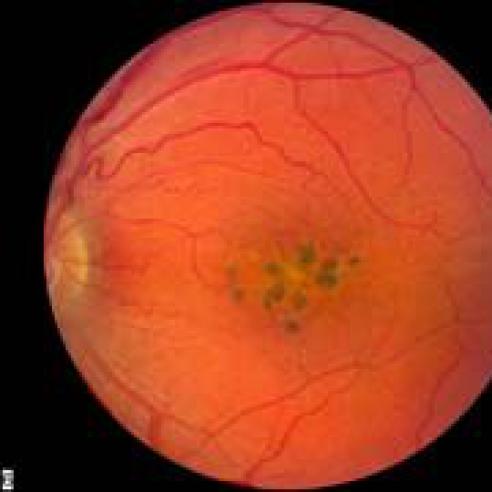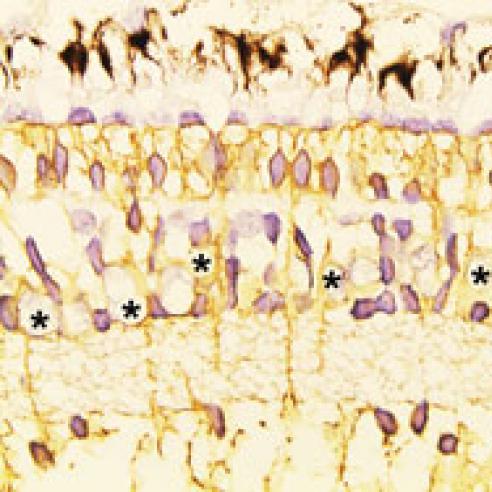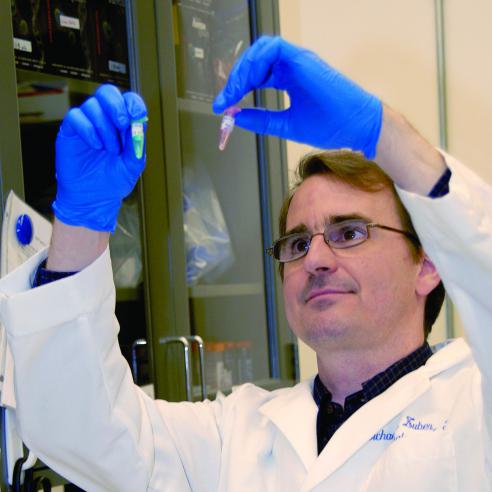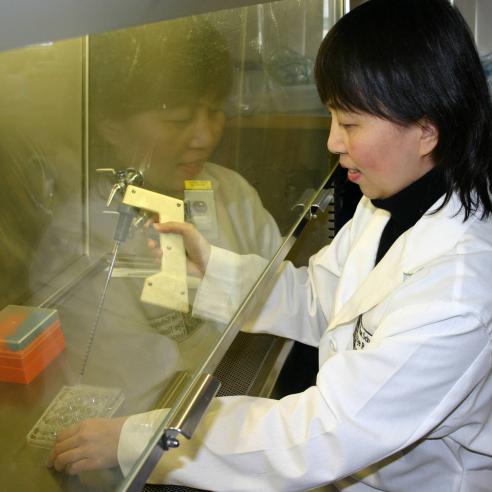RPB researchers are working to understand and prevent macular degeneration, to halt its progression, and to develop optical devices to offset vision loss.
Age-Related Macular Degeneration

Click on the image, above, to watch the Chairman of an RPB-supported department of ophthalmology, Jay S. Duker, MD, discuss age-related macular degeneration (AMD).
Age-related macular degeneration (AMD) is a vision disorder caused by abnormalities in a portion of the eye's retina called the macula. Early symptoms of AMD are blurred central vision and a waviness of straight lines. The blurriness may progress to blind spots, affecting reading, TV watching and many other pleasures of independent living. There are two stages of AMD. Early AMD is far more common but late AMD has a far greater impact on vision.
Late AMD can be subdivided into the dry, or non-neovascular, form and the wet, or neovascular, form (see illustration). Dry AMD is characterized by more extensive pigmentary abnormalities in the macula and by a somewhat extensive loss of pigment cells and vision cells in the central macula. It is called dry because it is not associated with abnormal blood vessels or leakage of blood or fluid.
Click one of the video selections to view.
An estimated 1.75 million Americans over age 40 have decreased vision from AMD. That number is expected to increase to 3 million by 2020.
Wet AMD occurs in about 10% of patients who have late AMD. It is characterized by an overgrowth of blood vessels, behind the macula, that leak blood or fluid or both. This leads to damage of the vision cells. Age is the single greatest risk factor for macular degeneration. Leaky blood vessels under the macula can cause changes in vision. Studies supported by RPB show that lifestyle choices may influence the onset and progression of AMD.
Related News: Age-Related Macular Degeneration

New Retinal Disease Discovered
RPB-supported researchers have found a new, rare inherited retinal disease. The investigators hope that finding the genetic cause will increase understanding of more common retinal diseases. The macula,...

Novel Pathway Helps Eyes Quickly Adapt to Darkness
Scientists have uncovered a previously unknown pathway in the retina that allows photoreceptor cells to adapt following changes in light exposure. The discovery could help scientists better understand diseases...

Stem Cells Generate New Retinal Cells Necessary for Vision
Pluripotent stem cells — those, like embryonic stem cells, that give rise to almost every type of cell in the body — can be converted into the different classes of retinal cells necessary for vision, according...

RPB-Supported Scientist Revolutionizes Gene Research
A dramatic new study, supported by Research to Prevent Blindness, questions some of the mechanisms underlying a new class of drugs based on Nobel Prize-winning work designed to fight diseases ranging from...

Discovery Opens Path for Drugs to Treat, Prevent Devastating Eye Diseases
SALT LAKE CITY –Two major eye diseases and leading causes of blindness—age-related macular degeneration and diabetic retinopathy—can be reversed or even prevented by drugs that activate a protein found in...

New Hope for Regenerating the Human Retina
In a radical breakthrough, RPB scientists have demonstrated the possibility of chemically signaling the eye's own resources to regenerate retina cells, without transplanting retinal tissue or stem cells. ...
Subscribe
Get our email updates filled with the latest news from our researchers about preventing vision loss, treating eye disease and even restoring sight. Unsubscribe at any time. Under our privacy policy, we'll never share your contact information with a third party.
| General Info | Research Scientists & Grantees | Eye Care Specialists | Donors & Partners |



